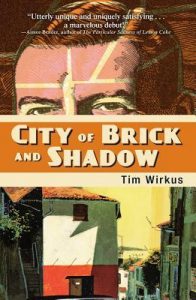 Author: Tim Wirkus
Author: Tim Wirkus
Title: City of Brick and Shadow
Gallery Books, 2014. 304 pages.
Reviewed by David Harris, Dec. 31, 2018
This is a very unusual book. A sort of detective novel, it combines elements of Latin American magical realism with a Mormon missionary narrative. Set in the slums of a large Brazilian city, it tracks the efforts of a pair of young elders who are attempting to track down a recent convert who has gone missing.
The book’s portrayal of missionary life is very accurate. The two elders are constantly negotiating their next move, with the more strong-willed senior companion, Elder Toronto, generally prevailing. His junior companion, Elder Schwartz, speaks poor Portuguese and is not thrilled to be on a mission. He just wants to keep his head down and get through the experience so that he can go home eventually and get on with the rest of his life.
The district leader and the mission president represent a burdensome bureaucracy which complicates the pair’s lives. In order to operate with the autonomy they desire, they have to pay lip service to the authority these parties represent. This entails a long bus ride to attend their weekly district meeting even though Elder Toronto feels the time would be better spent pursuing leads. Then, at the district meeting, they get news that the mission president is planning to visit them in two days as a part of an investigation as to whether to keep missionaries in their area, which is just one more thing to disrupt their agenda.
Some of the reviews I have read here make the case that this book is actually a character study of Elder Toronto. That’s a large part of it, I agree, and Toronto reminds me of one particularly obnoxious mission companion I had on my own mission. From the first moment he set eyes on me, he was sure he was smarter than I was. And he viewed his objectives as so much higher and more refined than my own that he didn’t think it was even all that important to try to explain them to me most of the time. I was just supposed to accept that he was smarter than me and follow after him like a puppy or something.
But, in my view, the main focus is Marco Aurélio, alias Aureliano Ribeiro, alias Marcos Mêlo, the missing convert, who turns out to be nothing like the person the elders thought he was. As the novel progresses, we learn more about him. But we never find out where he has gone or what his relationship is to the mysterious Argentine who purportedly controls the neighborhood.
One thing we do learn eventually is that Marco Aurélio is or was a con artist and that his ultimate fantasy was a long con involving numerous individuals, none of whom recognizes their role in the scam at any stage. This would seem to have some bearing on the jarring ending, although I think that, in the final assessment, it’s the author himself who has pulled off the biggest con here.
In any case, the novel is definitely a page-turner and a very enjoyable read, and it gives you a lot to think about once you finish the last page. I have to say that I found the ending more perplexing than satisfying, but I enjoyed going back through the book and re-reading several sections in order to try to pick up on details I might have missed during the first reading which I figured may help elucidate it.
